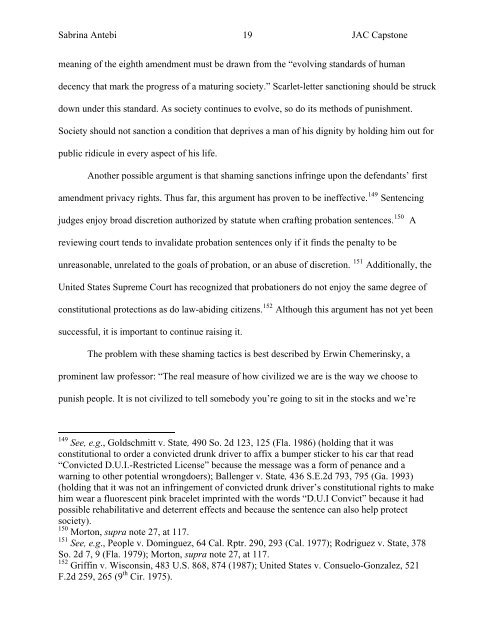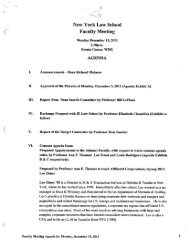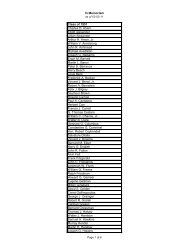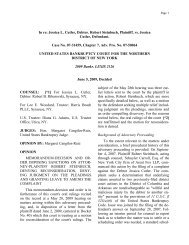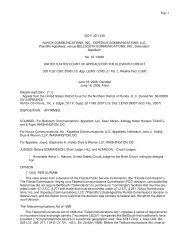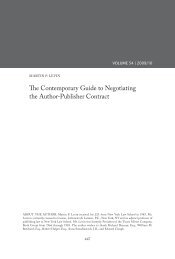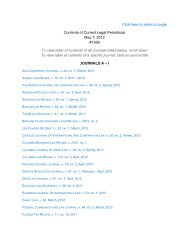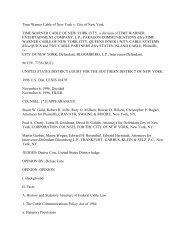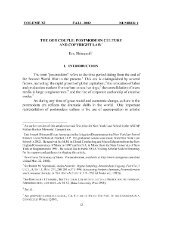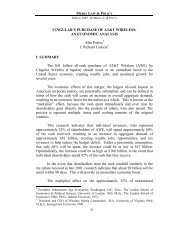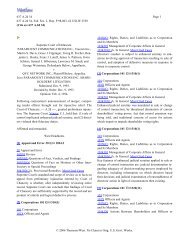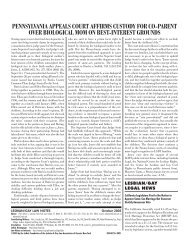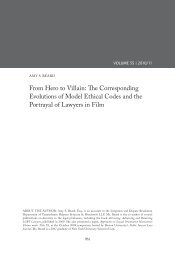The New Age of Scarlet-Letter Punishment - New York Law School
The New Age of Scarlet-Letter Punishment - New York Law School
The New Age of Scarlet-Letter Punishment - New York Law School
Create successful ePaper yourself
Turn your PDF publications into a flip-book with our unique Google optimized e-Paper software.
Sabrina Antebi 19<br />
JAC Capstone<br />
meaning <strong>of</strong> the eighth amendment must be drawn from the “evolving standards <strong>of</strong> human<br />
decency that mark the progress <strong>of</strong> a maturing society.” <strong>Scarlet</strong>-letter sanctioning should be struck<br />
down under this standard. As society continues to evolve, so do its methods <strong>of</strong> punishment.<br />
Society should not sanction a condition that deprives a man <strong>of</strong> his dignity by holding him out for<br />
public ridicule in every aspect <strong>of</strong> his life.<br />
Another possible argument is that shaming sanctions infringe upon the defendants’ first<br />
amendment privacy rights. Thus far, this argument has proven to be ineffective. 149 Sentencing<br />
judges enjoy broad discretion authorized by statute when crafting probation sentences. 150 A<br />
reviewing court tends to invalidate probation sentences only if it finds the penalty to be<br />
unreasonable, unrelated to the goals <strong>of</strong> probation, or an abuse <strong>of</strong> discretion. 151 Additionally, the<br />
United States Supreme Court has recognized that probationers do not enjoy the same degree <strong>of</strong><br />
constitutional protections as do law-abiding citizens. 152 Although this argument has not yet been<br />
successful, it is important to continue raising it.<br />
<strong>The</strong> problem with these shaming tactics is best described by Erwin Chemerinsky, a<br />
prominent law pr<strong>of</strong>essor: “<strong>The</strong> real measure <strong>of</strong> how civilized we are is the way we choose to<br />
punish people. It is not civilized to tell somebody you’re going to sit in the stocks and we’re<br />
149 See, e.g., Goldschmitt v. State, 490 So. 2d 123, 125 (Fla. 1986) (holding that it was<br />
constitutional to order a convicted drunk driver to affix a bumper sticker to his car that read<br />
“Convicted D.U.I.-Restricted License” because the message was a form <strong>of</strong> penance and a<br />
warning to other potential wrongdoers); Ballenger v. State, 436 S.E.2d 793, 795 (Ga. 1993)<br />
(holding that it was not an infringement <strong>of</strong> convicted drunk driver’s constitutional rights to make<br />
him wear a fluorescent pink bracelet imprinted with the words “D.U.I Convict” because it had<br />
possible rehabilitative and deterrent effects and because the sentence can also help protect<br />
society).<br />
150 Morton, supra note 27, at 117.<br />
151 See, e.g., People v. Dominguez, 64 Cal. Rptr. 290, 293 (Cal. 1977); Rodriguez v. State, 378<br />
So. 2d 7, 9 (Fla. 1979); Morton, supra note 27, at 117.<br />
152 Griffin v. Wisconsin, 483 U.S. 868, 874 (1987); United States v. Consuelo-Gonzalez, 521<br />
F.2d 259, 265 (9 th Cir. 1975).


